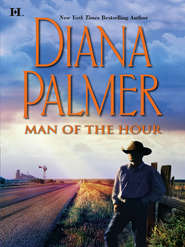По всем вопросам обращайтесь на: info@litportal.ru
(©) 2003-2024.
✖
The Maverick: The Maverick / Magnate’s Make-Believe Mistress
Автор
Год написания книги
2019
Настройки чтения
Размер шрифта
Высота строк
Поля
“You’d have seen it for yourself, Jones, eventually,” he replied. “You’re the best.”
“Wow! Did you hear that? Take notes,” Alice told the deputy. “The next time I get yelled at for not doing my job right, I’m quoting Kilraven.”
“Would it help?” he asked.
She laughed. “They’re still scared of you up in San Antonio,” she said. “One of the old patrolmen, Jacobs, turns white when they mention your name. I understand the two of you had a little dustup?”
“I threw him into a fruit display at the local supermarket. Messy business. Did you know that blackberries leave purple stains on skin?” he added conversationally.
“I’m a forensic specialist,” Alice reminded him. “Can I ask why you threw him into a fruit display?”
“We were working a robbery and he started making these remarks about fruit with one of the gay officers standing right beside me. The officer in question couldn’t do anything without getting in trouble.” He grinned. “Amazing, how attitudes change with a little gentle adjustment.”
“Hey, Kilraven, what are you doing walking around on the crime scene?” Cash Grier called from the sidelines.
“Don’t fuss at him,” Alice called back. “He just spotted a crucial piece of evidence. You should give him an award!”
There were catcalls from all the officers present.
“I should get an award!” he muttered as he went to join his boss. “I never take days off or vacations!”
“That’s because you don’t have a social life, Kilraven,” one of the officers joked.
Alice stood up, staring at the local law enforcement uniforms surrounding the crime scene tape. She recognized at least two cars from other jurisdictions. There was even a federal car out there! It wasn’t unusual in a sleepy county like Jacobs for all officers who weren’t busy to congregate around an event like this. It wasn’t every day that you found a murder victim in your area. But a federal car for a local murder?
As she watched, Garon Grier and Jon Blackhawk of the San Antonio district FBI office climbed out of the BuCar—the FBI’s term for a bureau car—and walked over the tape to join Alice.
“What have you found?” Grier asked.
She pursed her lips, glancing from the assistant director of the regional FBI office, Grier, to Special Agent Jon Blackhawk. What a contrast! Grier was blond and Blackhawk had long, jet-black hair tied in a ponytail. They were both tall and well-built without being flashy about it. Garon Grier, like his brother Cash, was married. Jon Blackhawk was unattached and available. Alice wished she was his type. He was every bit as good-looking as his half brother Kilraven.
“I found some bits and pieces of evidence, with the deputy’s help. Your brother,” she told Jon, “found this.” She held up the piece of paper in an evidence bag. “Don’t touch,” she cautioned as both men peered in. “I’m not unfolding it until I can get it into my lab. I won’t risk losing any trace evidence out here.”
Blackhawk pulled out a pad and started taking notes. “Where was it?” he asked.
“Gripped in the dead man’s fingers, out of sight. Why are you here?” she asked. “This is a local matter.”
Blackhawk was cautious. “Not entirely,” he said.
Kilraven joined them. He and Blackhawk exchanged uneasy glances.
“Okay. Something’s going on that I can’t be told about. It’s okay.” She held up a hand. “I’m used to being a mushroom. Kept in the dark and fed with…”
“Never mind,” Garon told her. He softened it with a smile. “We’ve had a tip. Nothing substantial. Just something that interests us about this case.”
“And you can’t tell me what the tip was?”
“We found a car in the river, farther down,” Cash said quietly. “San Antonio plates.”
“Maybe his?” Alice indicated the body.
“Maybe. We’re running the plates now,” Cash said.
“So, do you think he came down here on his own, or did somebody bring him in a trunk?” Alice mused.
The men chuckled. “You’re good, Alice,” Garon murmured.
“Of course I am!” she agreed. “Could you,” she called to the female deputy, “get me some plaster of Paris out of my van, in the back? This may be a footprint where we found the piece of paper! Thanks.”
She went back to work with a vengeance while two sets of brothers looked on with intent interest.
Chapter Two
Alice fell into her bed at the local Jacobsville motel after a satisfying soak in the luxurious whirlpool bathtub. Amazing, she thought, to find such a high-ticket item in a motel in a small Texas town. She was told that film crews from Hollywood frequently chose Jacobs County as a location and that the owner of the motel wanted to keep them happy. It was certainly great news for Alice.
She’d never been so tired. The crime scene, they found, extended for a quarter of a mile down the river. The victim had fought for his life. There were scuff marks and blood trails all over the place. So much for her theory that he’d traveled to Jacobsville in the trunk of the car they’d found.
The question was, why had somebody brought a man down to Jacobsville to kill him? It made no sense.
She closed her eyes, trying to put herself in the shoes of the murderer. People usually killed for a handful of reasons. They killed deliberately out of jealousy, anger or greed. Sometimes they killed accidentally. Often, it was an impulse that led to a death, or a series of acts that pushed a person over the edge. All too often, it was drugs or alcohol that robbed someone of impulse control, and that led inexorably to murder.
Few people went into an argument or a fight intending to kill someone. But it wasn’t as if you could take it back even seconds after a human life expired. There were thousands of young people in prison who would have given anything to relive a single incident where they’d made a bad choice. Families suffered for those choices, along with their children. So often, it was easy to overlook the fact that even murderers had families, often decent, law-abiding families that agonized over what their loved one had done and paid the price along with them.
Alice rolled over, restlessly. Her job haunted her from time to time. Along with the coroner, and the investigating officers, she was the last voice of the deceased. She spoke for them, by gathering enough evidence to bring the killer to trial. It was a holy grail. She took her duties seriously. But she also had to live with the results of the murderer’s lack of control. It was never pleasant to see a dead body. Some were in far worse conditions than others. She carried those memories as certainly as the family of the deceased carried them.
Early on, she’d learned that she couldn’t let herself become emotionally involved with the victims. If she started crying, she’d never stop, and she wouldn’t be effective in her line of work.
She found a happy medium in being the life of the party at crime scenes. It diverted her from the misery of her surroundings and, on occasion, helped the crime scene detectives cope as well. One reporter, a rookie, had given her a hard time because of her attitude. She’d invited him to her office for a close-up look at the world of a real forensic investigator.
The reporter had arrived expecting the corpse, always tastefully displayed, to be situated in the tidy, high-tech surroundings that television crime shows had accustomed him to seeing.
Instead, Alice pulled the sheet from a drowning victim who’d been in the water three days.
She never saw the reporter again. Local cops who recounted the story, always with choked-back laughter, told her that he’d turned in his camera the same day and voiced an ambition to go into real estate.
Just as well, she thought. The real thing was pretty unpleasant. Television didn’t give you the true picture, because there was no such thing as smell-o-vision. She could recall times when she’d gone through a whole jar of Vicks Salve trying to work on a drowning victim like the one she’d shown the critical member of the Fourth Estate.
She rolled over again. She couldn’t get her mind to shut down long enough to allow for sleep. She was reviewing the meager facts she’d uncovered at the crime scene, trying to make some sort of sense out of it. Why would somebody drive a murder victim out of the city to kill him? Maybe because he didn’t know he was going to become a murder victim. Maybe he got in the car voluntarily.
Good point, she thought. But it didn’t explain the crime. Heat of passion wouldn’t cover this one. It was too deliberate. The perp meant to hide evidence. And he had.
She sighed. She wished she’d become a detective instead of a forensic specialist. It must be more fun solving crimes than being knee-deep in bodies. And prospective dates wouldn’t look at you from a safe distance with that expression of utter distaste, like that gardener in the hardware store this afternoon.
What had Grier called him, Fowler? Harley Fowler, that was it. Not a bad-looking man. He had a familiar face. Alice wondered why. She was sure she’d never seen him before today. She was sure she’d remember somebody that disagreeable.
Maybe he resembled somebody she knew. That was possible. Fowler. Fowler. No. It didn’t ring any bells. She’d have to let her mind brood on it for a couple of days. Sometimes that’s all it took to solve such puzzles—background working of the subconscious. She chuckled to herself. Background workings, she thought, will save me yet.
After hours of almost-sleep, she got up, dressed and went back to the crime scene. It was quiet, now, without the presence of almost every uniformed officer in the county. The body was lying in the local funeral home, waiting for transport to the medical examiner’s office in San Antonio. Alice had driven her evidence up to San Antonio, to the crime lab, and turned it over to the trace evidence people, specifically Longfellow.











